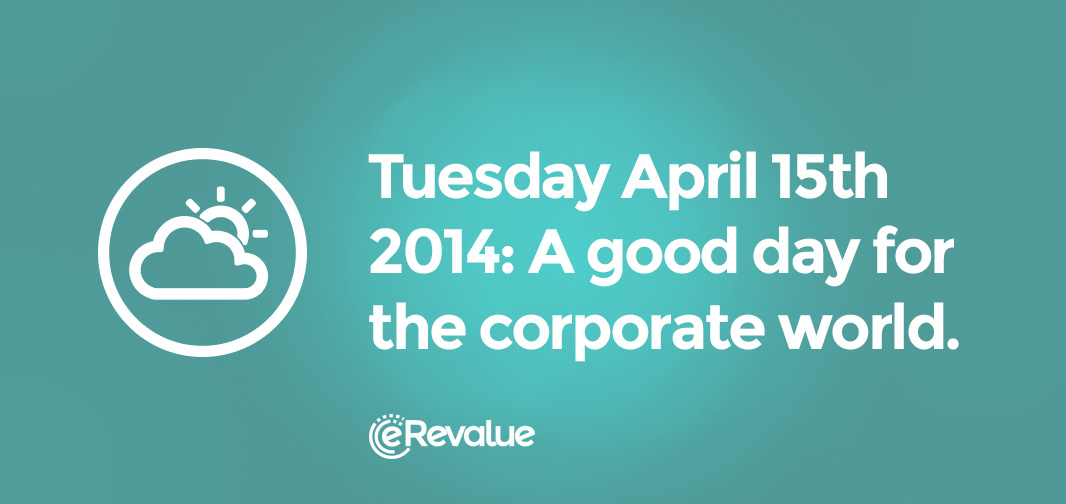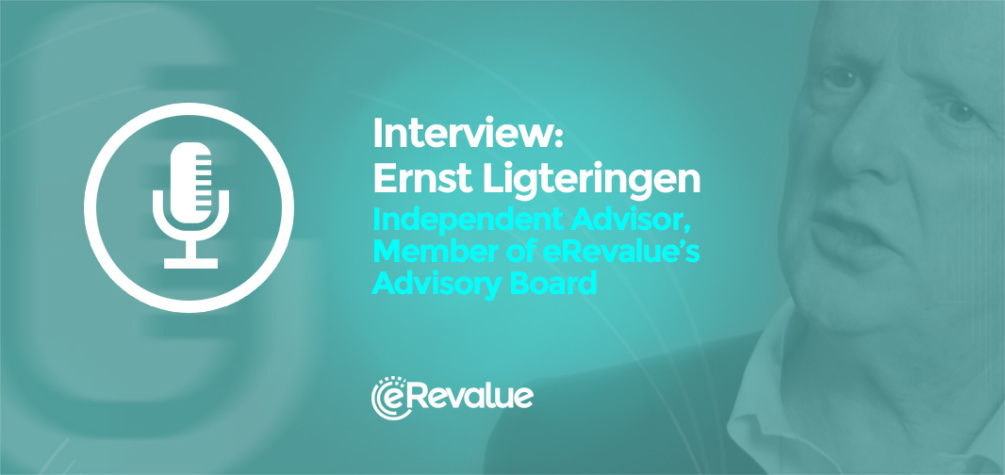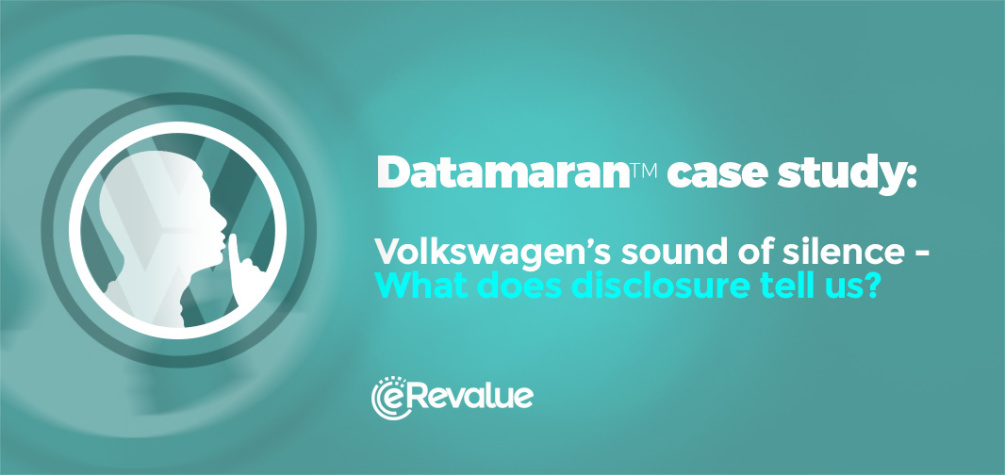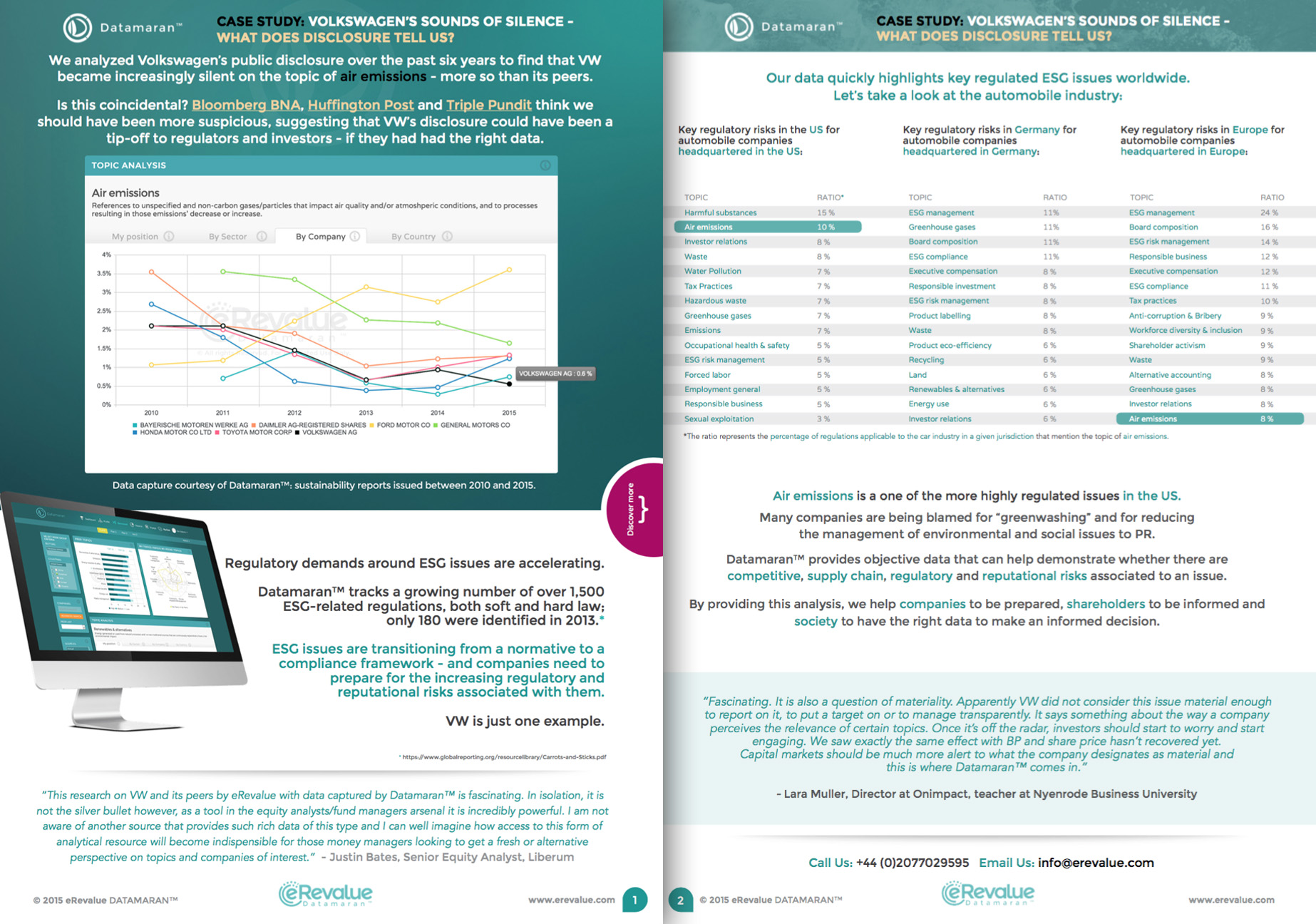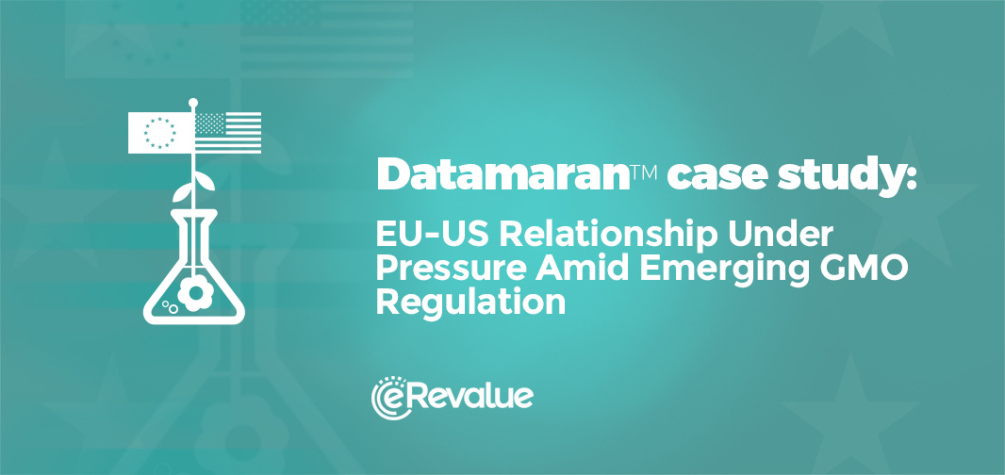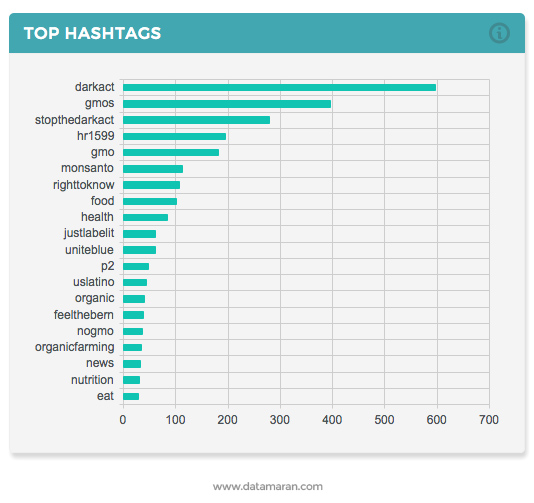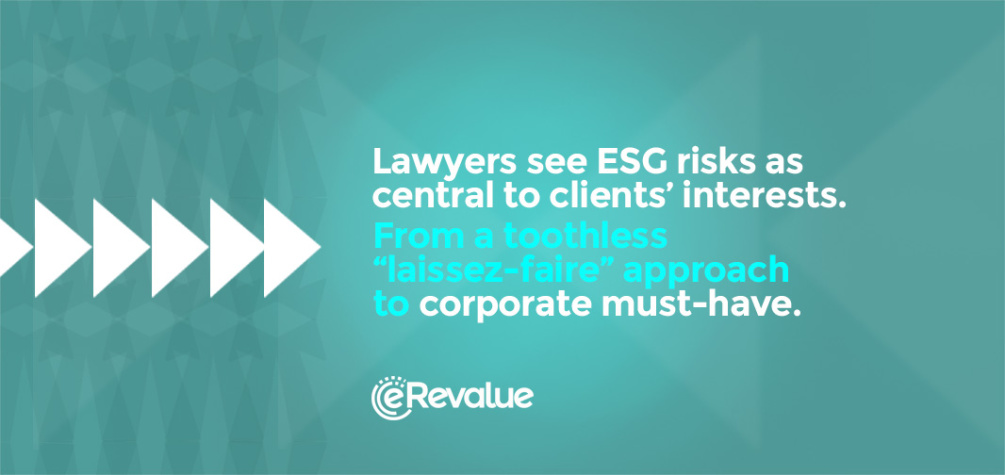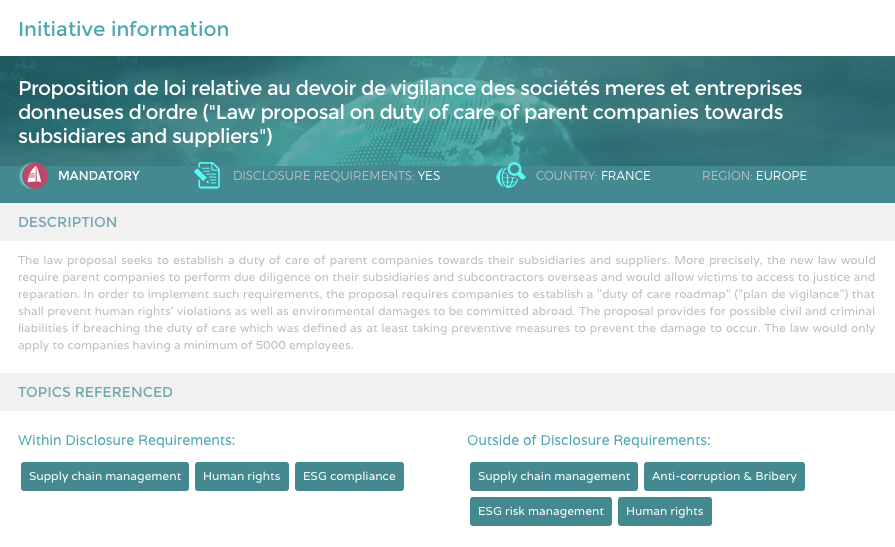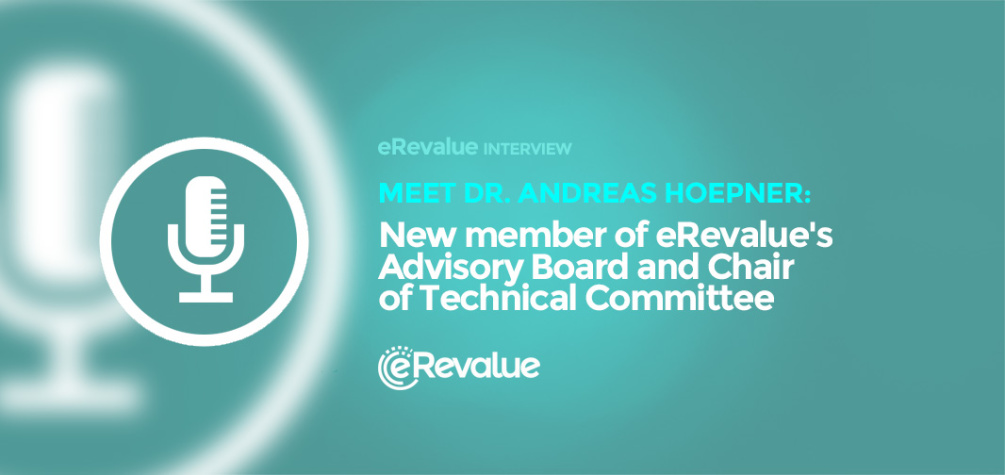eRevalue BLOG
Interview: Ernst Ligteringen, Independent Advisor, former CE GRI, Member of eRevalue’s Advisory Board
Ernst Ligteringen is a global thought leader in policy, strategy, and technical development of sustainable business practice. As former Chief Executive and pioneer of the Global Reporting Initiative (GRI) – the globe’s leading standard for non-financial reporting – he has witnessed first-hand how ESG issues can create value, but also destroy it, in business. As Ernst explains, Volkswagen is only one example.
We sat down with Ernst, now member of our Strategic Advisory Board, to explore how ESG issues have shaped business over the past 20 years, and to consider what the future of corporate transparency looks like.
Click the image to enlarge or download the PDF here.
Featured on Bloomberg BNA, Huffington Post, TriplePundit.
EU-US Relationship Under Pressure Amid Emerging GMO Regulation
Genetically Modified Organisms (GMOs) have been shrouded in controversy since the first transgenic seeds were first commercialized over 20 years ago. While biotech companies have claimed that genetically modified crops could play a major role in mass producing food sources to meet the needs of the global growing population, consumers are raising concerns over the potential health risks associated with GM food consumption.
In the US, a country where as much as 80% of conventional processed foods contains GMOs, the controversy around biotech food is gaining momentum following the recent Safe and Accurate Food Labeling Act of 2015 (H.R.1599). The bill, which was approved by the U.S. House of representatives on 23 July 2015, aims to set a voluntary federal standard on labelling of foods containing GMO ingredients, and has generated major social media debate.
With Datamaran™, we listened to this evolving debate to better understand what was driving the discussion.
Data capture courtesy of eRevalue’s Datamaran™
Zooming on conversations arounds the topic of product labeling, Datamaran™ shows that the top debated issues are #GMOs and the #DarkAct or, as the recent bill has been nicknamed by environmentalists and consumers, Deny Americans the Right to know. These environmentalists and consumers believe GMO foods are unsafe to eat.
Another top issue is #justlabelit – a campaign advocating for the mandatory labeling of GMOs and that has received over 1.4 million signatures to date.
Data capture courtesy of eRevalue’s Datamaran™
For consumers in Europe, the concern over the change in food labelling policies in the U.S. is tied to the on-going negotiations of the Transatlantic Trade and Investment Partnership (TTIP), a bilateral treaty that aims to reduce regulatory trade barriers between the EU and North America.
Since the negotiations for the TTIP started in 2013, questions have been raised as to how the treaty would affect Europe’s ”precautionary principle” approach to food safety standards, particularly as the negotiations for the TTIP are being conducted without public consultation.
More recently, organizations like Greenpeace have questioned whether member states are being pressured by North American companies to allow imports of genetically modified foods, especially after the announcement that seventeen new genetically modified food products had been authorised for import to Europe.
Over 60 countries around the world have passed strict labelling laws in recent years, and have made significant restrictions on the production and sale of GMOs. But while companies claim to be taking steps to address consumer backlash on transgenic organisms, our data confirms negligible mention of GM labeling in corporate filings (sustainability, financial, and SEC) published from 2010 to present.
As the TTIP negotiations continue and the U.S. Congress will soon make a final debate on GMOs labelling regulations, we anticipate that the discussion on food safety and biotech food will only continue.
Who will take the lead in this debate? Companies, regulators, or the public? Stay tuned as we continue to observe aboard Datamaran™.
Lawyers see ESG risks as central to clients’ interests
From a toothless “laissez-faire” approach to corporate must-have.
By Emmanuelle Haack, Associate Regulatory Analytics
Last October 2014, the 28 EU member states adopted the binding EU Directive on disclosure of non-financial information. More recently, a new French proposal for a binding new reporting framework is signalling further regulatory upswing.
Two years after the Rana Plaza tragedy, the French proposal seeks to make parent companies liable for their global supply chain; representing a move to a full liability regime with fines of up to €10 million.
Data capture courtesy of eRevalue’s Datamaran™
Until recently, the law has played a limited part in the push for corporate transparency on environmental, social, and corporate governance (ESG) issues, a space that has been largely unfocused and undefined. Transparency on these issues was, until recently, fueled by NGO and corporate initiatives to “do good.”
Consequently, many companies were blamed for green washing, as their reports lacked rigor and were disconnected from the business.
During the “voluntary days”, lawyers were seen as “discouraging too much disclosure on these issues,” consistent with guidance to keep reports uncluttered, whereas corporate communications and sustainability professionals were advocating greater transparency. This type of transparency was most often incorporated into sustainability reports that were less likely to be subject to the same level of rigorous verification as an annual (financial) report.
But the time has come for the inevitable friendship between lawyers and corporate ESG experts. Our latest research shows a 45% growth in the number of ESG related regulations calling for more robust corporate transparency worldwide since 2012.
As Vanessa Harvard-Willams, head of Linklaters’ sustainability practice and co-head of its risk and governance team, explains: “Regulatory developments around ESG should be watched closely by business and lawyers alike – we are now making the transition from a normative to a compliance framework. Although the regulatory risks of non-compliance with these regulations are often quite limited, the potential reputational and commercial damage from being seen not to comply can be significant.”
With ESG issues becoming regulated, business has to be in a position to provide the required information in a timely and accurate way. Non-compliance with these new regulations is likely to bring with it reputation risks, in addition to triggering potential regulatory fines and, in a few cases, litigation threats. Over time, it may also give rise to procurement issues where business or government purchasers apply ESG criteria.
Companies have to ask themselves: how do we understand these new regulatory risks and opportunities, and are our legal teams and advisors equipped with the right information to respond?
Incoming regulations in this area are often less developed than in more mature areas of law; this causes problems in determining what information is required, and in drawing the line between “nice-to-have” and “must-have.”
Take conflict minerals as an example. This topic gained importance in 2012 with the U.S. Dodd-Frank Act. On 20 May 2015, the EU Parliament received 400 positive votes that EU importers sourcing in conflict areas should disclose this information. More regulation seems likely, though the capacity of businesses to supply demonstrably conflict free minerals remains very restricted at present.
In the meantime, EU-registered large or listed companies engaged in extractive activities are preparing to report on any payments within certain categories made to government or government owned entities above €100,000 with respect to these activities. Reporting will commence in financial year 2016 for the UK and in financial year 2017 for the rest of the EU.
Companies active in the UK with a turnover of £36 million will also be required to report on the steps taken to ensure that their own activities and those of their supply chains are free from modern slavery and human trafficking, under a reporting obligation that takes force October 2015.
Let’s look at the broader momentum for more robust disclosure.
Governments are increasingly enacting transparency requirements within their legal regimes. This is, in part, a move to contain global corruption risks, as well as a response to pressure from civil society and to the eroding tolerance of the public for governance failures in the private sector.
In some cases, countries perceive that having strong regulatory frameworks will help them to benefit from the soaring amount of cross-border investments that are happening nowadays. Maybe they understand that in today’s hyper-connected world, the reputation of a country cannot be seen separate from the reputation of the companies driving its economy.
With the Toshiba scandals spread all over major headlines last month, Japan suffered. In Japan, regulatory changes are a fundamental part of the process to restore trust following a series of governance failures.
It is no coincidence that the new Japanese Corporate Code of Governance was recently revised: the country is moving towards building a new corporate governance image following high profile challenges, including Toyota in 2010, Olympus a year later, the management of the Great Earthquake in 2011 and, most recently, the Toshiba issues.
These examples shed light on the importance of an effective regulatory framework to facilitate a country’s ability to prevent serious wrongdoing, subsequent cover-ups and severe financial consequences.
Integrating ESG and transparency is without question becoming the new normal – and not just from a compliance standpoint. Companies that dare to ignore those developments are at high regulatory, reputational, and competitive risk. As a business, it vital to understand which countries are pushing the envelope.
Here are a few tips for being prepared.
First, look at voluntary guidance. Many regulations derive their inspiration from already existing international standards and voluntary guidance, such as the Ruggie Principles, the Global Reporting Initiative Guidelines, the 2015 OECD Principles of Corporate Governance or the ILO Declarations.
Helle Bank Jorgensen, Chairman of eRevalue, CEO for the advisory firm B. Accountability and a facilitator for UN Global Compact Board Program confirms the development from soft to hard law over her 25-year-career: “When I studied business law and trained to become a state authorised public accountant, it was legal to deduct bribery in tax-returns, though not well-regarded.”
“Today,” she explains, “MBA students are shocked that it has ever been legal. The late Ray Anderson, founder of Interface might have said it best: ‘In the future people like me will go to jail.’ He was referring to the environmental harm companies could legally do.”
“Another example,” Jorgensen continues, “is the above-mentioned French law proposal. Since the mid-nineties, I have helped many leading brands in building responsible supply chain programs; however, it all started because stakeholders wanted to hold companies to a higher standard, while the CEOs originally said this is not our responsibility – it is that of our suppliers. So yes, stakeholder dialogue and keeping an eye on soft regulations is a must for companies that want to last in this fast-changing environment.”
Second, watch the Courts. The Dutch Court breakthrough judgement in June added a momentum to climate change that is now reverberating in global civil movements worldwide. By ruling that the government was knowingly contributing to a breach, the Hague allowed a group of citizens to sue their government over its inaction on climate change.
With Belgium, Norway and the UK already embracing similar initiatives, it is said that the Urgenda Climate Case could act as a powerful precedent for more cases to be triggered.
Third, watch how companies and law firms respond to a new compliance regime. These new laws and rulings need to be implemented by putting company secretaries and general counsel front and center.
Sustainability issues are no longer dealt exclusively with by the corporate responsibility committee or corporate communications professional. Business need to understand the issues from a legal perspective, and prepare to respond accordingly.
More broadly, sustainability and business’ role in society are increasingly important issues for boards to consider and manage together with other enterprise risks and opportunities.
Last week, for instance, we witnessed the launch of a Campaign urging listed company’s board of directors to issue an annual Statement of Significant Audiences and Materiality in order to communicate publically who their stakeholders are and what are the material issues or objectives of the company.
The American Bar Association, UN Global Compact General Counsel Ursula Wynhoven and Professor Robert Eccles initiated a knowledge sharing project to enable this project.
Through notes posted with the ABA, law firms around the world have explained the treatment of sustainability issues under corporate law relating to directors’ duties and company reporting. The focus of this exercise, much like the work done by law firms in support of Professor Ruggie’s UN Guiding Principles on Business and Human Rights is to define the parameters of those legal duties.
In particular, there was value in clarifying that social and environmental risks can form one of a range of factors to be considered in the discharge of fiduciary and other duties, demonstrating what is known in the UK as “enlightened shareholder value.”
The template for these notes was developed by the team with Havard-Williams of Linklaters.
The above examples reinforce the growing regulatory push for more robust transparency, and the resulting complexity of understanding the evolving changes and high cost associated with keeping up.
What’s next? Some questions we’re thinking about include: how is the sharing economy going to be regulated? What about the circular economy? Are there going to be further rulings on supply chain responsibility? Or, as questioned in this week’s FT article, are stock exchanges going to tighten up their listing requirements on ESG?
Learn more about how we’re staying on-top of today’s rapidly changing regulatory landscape aboard Datamaran™.
We’d like to thank Vanessa-Havard Williams (Linklaters) and Helle Bank Jorgensen (eRevalue, B.Accountability, UN Global Compact) for their contributions.
“Datamaran is… probably the most efficient tool to achieve an in-depth understanding of corporate reporting ever built. The regulatory radar in particular has the potential to disrupt classical financial analysis across many sectors and asset classes. I strongly expect its information to prove financially material for corporates, advisors, and investors alike.”
Dr. Andreas Hoepner, new member of eRevalue’s Advisory Board and Chair of Technical Committee
Incorporating ESG issues into investment analysis and decision-making processes is becoming mainstream. More than a moral obligation, companies worldwide are increasingly seeking for opportunities that combine environmental and social benefits to solid returns.
This rising trend is a key incentive for corporations, who now see ESG strategy as an opportunity to attract long-term investors, promote new products and access capital. But increasing regulatory requirements are also forcing companies to anticipate emerging ESG risks, particularly for those vulnerable to breach major international norms when entering new markets.
Just as important as keeping an eye on regulatory developments, it is essential to keep track of reputational performance; while issues like corruption and bribery are hard to quantify, it is possible to measure the negative impact that such risks could have on companies and stakeholders- the FIFA case being a prime example.
Driven by rising demand and deeper engagement from Millennial and female investors, ESG related investment is now a profitable trend, with one out of every six dollars of assets under professional management in the US – a total of US $6.6trn –allocated on responsible investment in 2014. It is estimated that 70 percent of individual investors are now interested in ESG related investments.
eRevalue interviewed Dr. Andreas Hoepner, fellow at the UNPRI and Associate Professor of Finance at the ICMA Centre of Henley Business School, to discuss emerging trends in responsible investing, the role of technology in adding value to the investment process, and how long-term investors are becoming more effective providers of capital.
Joining Dr. Hoepner on eRevalue’s Technical Committee are Dr. Damian Borth, Ian van der Vlugt, Andy Moniz and Sean Gilbert.


